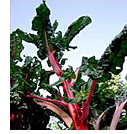
Archives
Not a subscriber?
Unsubscribe
Update e-mail address
November 2010 [Volume 9, Issue 11]
To Your Health is brought to you by:
In this issue of To Your Health:
- Veterans With Traumatic Brain Injury Report Relief With Acupuncture
- Herb of the Month – Rhubarb (da huang)
- Ask an Acupuncturist
Veterans With Traumatic Brain Injury Report Relief With Acupuncture
By Lynne Morgan, RN, LAc, OMD
 Returning veterans are being diagnosed with traumatic brain injury in alarming numbers that are secondary only to post-traumatic stress disorder and chronic pain.
Returning veterans are being diagnosed with traumatic brain injury in alarming numbers that are secondary only to post-traumatic stress disorder and chronic pain.
The movie, "The Hurt Locker," which received best picture of the year, helps to portray what our veterans are being exposed to during war time. It is easy to see through the lens of a camera why we see traumatic brain injury occurring at such high rates.
Traumatic brain injury is defined as a non-degenerative, non-congenital insult to the brain from an external mechanical force, leading to possible concussion, skull fractures, internal hemorrhage or other internal injuries. This might result in permanent or temporary impairment of cognitive, physical and psychosocial functions with an associated diminished or altered state of consciousness.
A High-Risk Environment
Veterans are at high risk for traumatic brain injury and blast-related concussions because of the frequent exposure to improvised explosive devices, suicide bombers, land mines, mortar rounds and rocket-propelled grenades. These types of injuries account for more than 65 percent of combat injuries, and of these vets, 60 percent have symptoms of traumatic brain injury.
Herb of the Month – Rhubarb (da huang)
 What is rhubarb? What is it used for?
What is rhubarb? What is it used for?
Although most people think rhubarb is a fruit, it's actually a vegetable, and one of only a handful of perennial vegetables on the planet. There are several varieties of rhubarb available.
The most common type, rheum rhaponticum, is found in the U.S. Chinese rhubarb (rheum palmatum or da huang) is similar in appearance to the American version, but has a much stronger taste and a slightly different chemical composition.
Rhubarb is an extremely hardy plant, and can grow in almost any environment. The plant's stalks are stiff and can grow up to three feet in length; each stalk is tipped with a large, textured, spade-shaped leaf. Rhubarb leaves are considered poisonous and should not be eaten. The root is used medicinally.
Rhubarb root has a long history in traditional Chinese medicine; its uses were first documented in the Divine Husbandman's Classic of Materia medica, which was written approximately 2,200 years ago. Originally, herbalists used rhubarb as a laxative, and to evacuate the bowels and improve the digestive tract. Rhubarb has also been found useful in treating jaundice, endometriosis, and (topically) burns and skin ulcers. Furthermore, rhubarb has the ability to fight infectious fungi such as candida, and infections of the lungs and eyes.
How much rhubarb should I take?
As a decoction, herbalists recommend putting 1-1.5 teaspoons of pulverized, crushed rhubarb root in one cup of boiling water and letting the mixture for 10 minutes. The tea can be taken twice a day. Most herbal preparations of rhubarb, however, are individually prepared for each patient. Rhubarb may be combined with other herbs.
What forms of rhubarb are available?
Wild rhubarb still grows in various parts of the U.S. Dried rhubarb is available at nearly every Asian market or specialty health food store. Some stores also sell rhubarb extracts and tinctures.
What can happen if I take too much rhubarb? Are there any interactions I should be aware of? What precautions should I take?
Rhubarb should not be taken by children under the age of 12, or by women who are pregnant or nursing. It should also not be taken by patients with acute or chronic intestinal disorders, such as Crohn's disease.
The most common side-effect noted with rhubarb is abdominal cramping; however, this condition is often relieved by reducing rhubarb dosage. Excessive use of rhubarb can lead to nausea, vomiting, diarrhea, and possible liver and kidney damage. Long-term use can lead to cirrhosis of the liver and hypokalemia (a metabolic imbalance characterized by low potassium levels in the blood).
Due to a possible loss of potassium, rhubarb root should not be taken in combination with cardiac medications, diuretics or steroids. Loss of potassium can be decreased by combining rhubarb root with licorice root.
As always, make sure to consult with a licensed, qualified health care professional before taking rhubarb or any other dietary supplement.
Question: I have started my son on acupuncture for his ADHD. He has had three sessions now, but I'm finding his behavior is getting worse. Is this normal? Does it get worse before it gets better?
Answer: Symptoms sometimes get worse before improving. This is not always what happens. ADHD is known to have periods of aggravation and amelioration. Usually ten to fifteen treatments is a course for these symptoms. If possible, wait till then to evaluate the effect acupuncture has.
Unsubscribe
Thank you for subscribing to To Your Health. If you have received
this newsletter in error or wish to unsubscribe, you may remove your name
from our e-mail subscription list at www.acupuncturetoday.com/newsletter/TYH/unsubscribe.php.
Update your e-mail address
To update the e-mail address your newsletter is sent to, click here.
If you have any questions regarding your subscription, please complete this form at www.acupuncturetoday.com/newsletterhelp/TYH.

